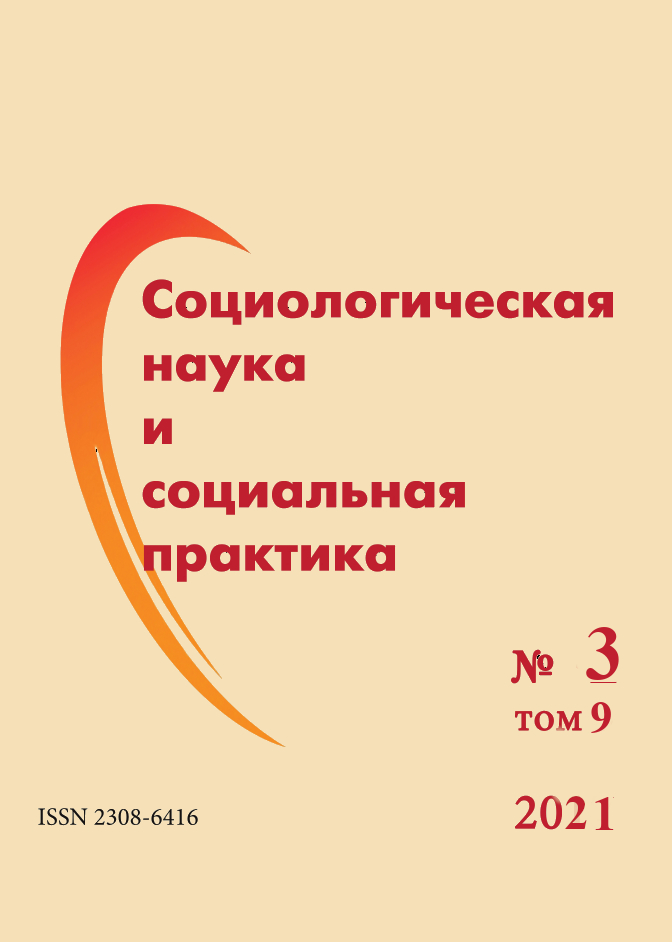Доверие в пандемию: сохранить нельзя изменить. А что чувствует регион? (на примере Вологодской области)
Научная статья
Аннотация
Литература
2. Гидденс Э. Последствия современности / Э. Гидденс ; пер. с англ. Г. К. Ольховикова, Д. А. Кибальчича ; вступ. статья Т. А. Дмитриева. М. : Издательская и консалтинговая группа «Праксис», 2011. 352 с.
3. Дюркгейм Э. Г. О разделении общественного труда. Метод социологии / Э. Г. Дюркгейм ; общ. ред. А. Б. Гофмана. М. : Наука, 1991. 575 c.
4. Вебер М. Избранные произведения : пер. с нем. / М. Вебер ; сост., общ. ред. Ю. Н. Давыдова. М. : Прогресс, 1990. 808 с.
5. Проблемы перехода на дистанционное обучение в Российской Федерации глазами учителей / Д. И. Сапрыкина, А. А. Волохович ; Национальный исследовательский университет «Высшая школа экономики», Институт образования. М. : НИУ ВШЭ, 2020. 32 с. (Факты образования. № 4 (29)).
6. Ромашкина Г. Ф. Обобщенное доверие: концептуализация и измерение / Г. Ф. Ромашкина, В. А. Давыденко, Ю. В. Ушакова // Вестник Санкт-Петербургского университета. Социология. 2018. Т. 11. № 4. С. 464–486. DOI 10.21638/spbu12.2018.406.
7. Селигмен А. Проблема доверия / Пер. с англ. И. И. Мюрберг, Л. В. Соболевой. М. : Идея-Пресс, 2002. 200 с.
8. Тённис Ф. Общность и общество. Основные понятия чистой социологии / Ф. Тённис ; пер. с нем. Д. В. Скляднева. СПб. : Владимир Даль, 2002. 452 с.
9. Штомпка П. Доверие – основа общества / П. Штомпка: пер. с пол. Н. В. Морозовой. М. : Логос, 2012. 445 с.
10. Blau P. M. Exchange and Power in Social Life. New-York : Wiley, 1964. 429 p.
11. Gambetta D. Can We Trust Trust? // Trust: Making and Breaking Cooperative Relations / Ed. by D. Gambetta. Oxford : Oxford University Press, 2000. P. 213–237.
12. Giddens A. Social theory and modern sociology. Cambridge : Polity Press, 1990.
13. Luhman N. Trust and power. Chichester : Wiley, 2017. 224 p.
14. Luhmann N. ‘Familiarity, Confidence, Trust: Problems and Alternatives’ // Trust: Making and Breaking Cooperative Relations / Ed. by D. Gambetta. Oxford : Oxford University Press, 2000. pp. 94–107. URL: http://www.sociology.ox.ac.uk/papers/luhmann94-107.pdf. (дата обращения: 06.02.2020).
15. Simmel G. Soziologie. Untersuchungen über die Formen der Vergesellschaftung // G. Simmel. Gesamtausgabe (11). Hrsg. Otthein Rammstedt. Frankfurt am Main : Suhrkamp, 1992.
Поступила: 25.05.2021
Опубликована: 28.09.2021








 Издатель: Федеральное государственное бюджетное учреждение науки
Издатель: Федеральное государственное бюджетное учреждение науки